Weaving baskets have been a part of Zulu culture for centuries, with men traditionally handling the weaving up until 1800. The arrival of European colonizers marked a significant shift in the practice, with men being forced to work in the mines and women being left to learn the skill and produce items for day-to-day use. This continued till approximately 1920, when the introduction of foreign utensils such as cups, containers, and pans found their way to the most remote regions of Zulu land through trade, leading to a sharp decline in basket weaving.
The art of weaving Zulu baskets came close to being lost forever.
Luckily, in an attempt to convert the locals to Christianity, a Lutheran missionary established a basket-weaving school and found several older women who were willing to teach this precious skill. Today, it's the remarkable women who carry out the weaving, earning an income for themselves while the men are away working in the mines.
This African basket, known as the Zulu Ilala palm basket, is one of the most popular woven items from South Africa. Handwoven with all-natural fibers, materials, and dyes, each basket is a unique treasure that captures the essence of rural South Africa. This masterpiece is brought to life by skilled artisans in the northeast coastal and inland areas of KwaZulu Natal, where subsistence farming is the norm and traditional family dwellings, known as Kraals, are marked by acacia sticks.
Typically, grandmothers impart their weaving expertise to their granddaughters, resulting in not just the preservation of this cultural practice but also the sharing of oral histories and stories. As they gather to weave, the younger generation is immersed in the vibrant tapestry of Zulu culture.
Driven by the same goal to preserve this stunning African basket, we at the African Angel Art present you with some of the finest Zulu Ilala palm baskets—perfect for adding a rustic and tribal touch to any home. Every African basket in our catalog is handwoven with precision, artistry, and true craftsmanship. Buy one of these unique pieces of African history today!

